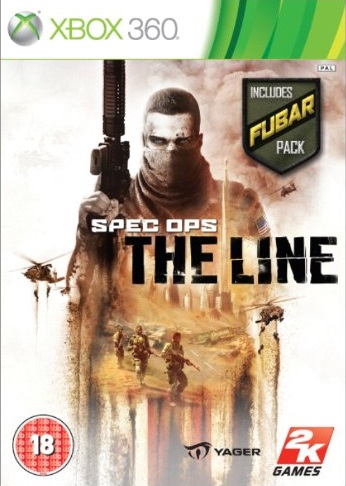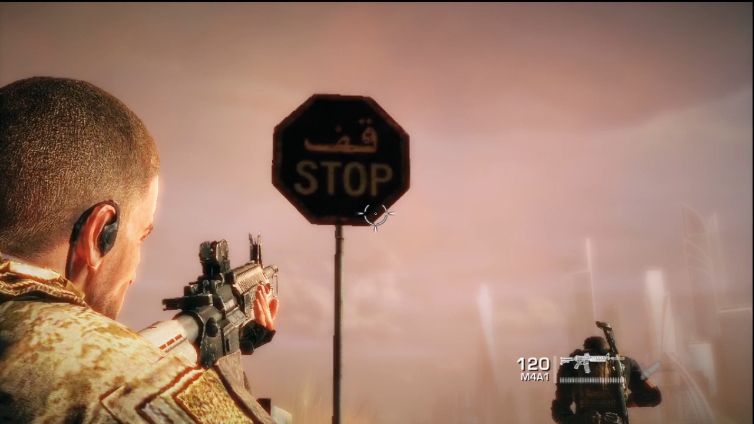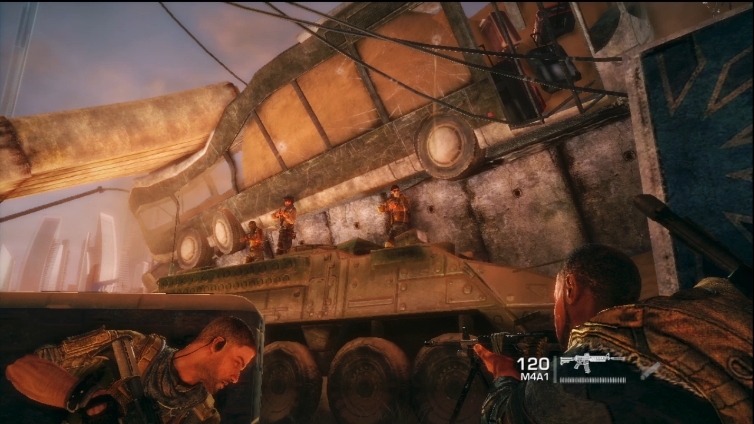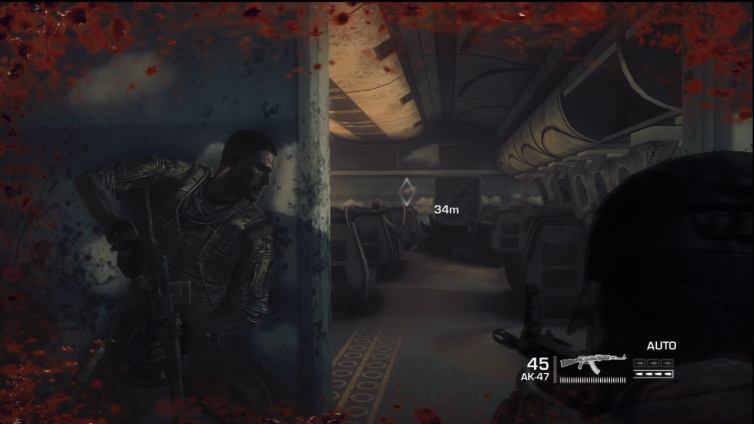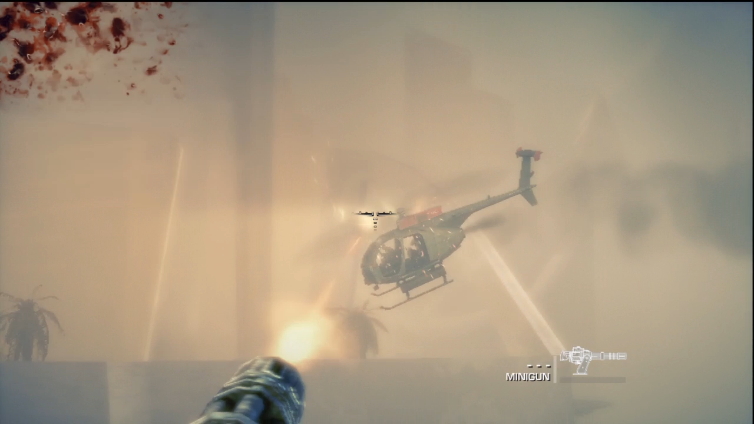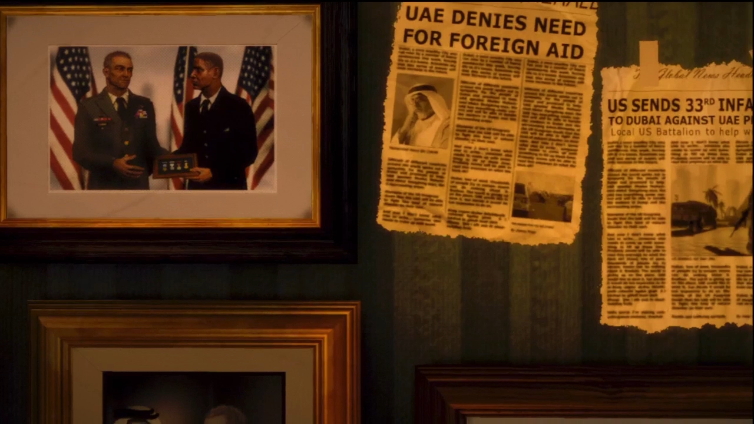SPEC OPS: THE LINE (X360)
Though continuing a PlayStation-era franchise entailing realistic military shooters, Spec Ops: The Line has almost nothing in common with those games. Yager have aimed to deliver a visual viewing of the horrors of war, the effects of post traumatic stress disorder and the thin line of morality which, more often than not, is crossed in such conflicts. And in that regard, there’s no denying that they have succeeded: the story is comparable to films such as Apocalypse Now in terms of its commentary on the perils of war. However, games are also supposed to be played and not just dissected for analysis, and run-of-the-mill mechanics combined with stark replay value diminish this shooter.
Set in a vision of Dubai torn apart by vicious sandstorms, you take the role of Sgt. Walker. Along with two other squad mates, he enters this post-apocalyptic desert to track down a radio signal from a mysterious source, indicating survivors in the city. While attempting to find the source, the squad also hope to track down a rugged war hero somehow tangled up in this mess known as Conrad. However, it’s clear that things aren’t all they seem, and the game rapidly descends into chaos from there. Objectives change, twists come and the gamer is subjected to some rather gruesome scenes, and this all adds up create The Line’s strongest aspect. The ending really changes your perspective on what happens in the campaign, and it actually feels almost uncomfortable when you experience certain events after realising the true context of them.
It’s clear Yager’s main objective was to express their views on war and conflicts. The Line demonstrates the consequences of civilian casualties, the stresses of having to kill rogue soldiers and questions the very nature of war itself. These ideas are raised, but not with sledgehammer force, making it much more intelligent. These themes can manifest themselves through decisions you make throughout the game. It is not merely choosing between yes or no, and you actually perform these decisions in-game, meaning you feel every consequence personally. The only disappointment is that these decisions don’t really add to the conclusion – they are discussed, but the same endgame emerges no matter what you do. The ending is very malleable however, with four possible outcomes, each containing their own powerful message.
So while a notable experience unto itself, it comes back to the argument that games are meant to be played and not watched. It’s true that many of Spec Ops’ strongest aspects manifest themselves outside of gameplay, and while The Line is far from poor, shooting is dreadfully run of the mill. Following the standard third-person template, you wade through the game using a cover system that's a staple of most modern shooters. Clumsily, the melee and cover-vault moves are mapped to one button, causing you to punch cover more often than not. Disparate elements float around Spec Ops, including some thin squad options, sandstorms which completely blind you and environmental hazards that let you drown enemies in sand, but none of these help Spec Ops rise above a functional but drab shooter, and the story can only keep the momentum going for so long until gunfights begin to feel repetitive.
But perhaps the most damning aspect of The Line is that it's extremely brief. Higher difficulties certainly present a challenge, but it can still be bested in a few hours. There is incentive for seconds, should you become invested enough in the story, but otherwise you could be done within a day. The Line also has a sub-par multiplayer mode which fails to add any extra value. A bland conformity to modern-shooter tropes, it completely strips what makes the single-player above average. Matches are extremely bloated, and though an XP system and multiple classes encourage some fun, most won’t find interest beyond their first game.
So while a notable experience unto itself, it comes back to the argument that games are meant to be played and not watched. It’s true that many of Spec Ops’ strongest aspects manifest themselves outside of gameplay, and while The Line is far from poor, shooting is dreadfully run of the mill. Following the standard third-person template, you wade through the game using a cover system that's a staple of most modern shooters. Clumsily, the melee and cover-vault moves are mapped to one button, causing you to punch cover more often than not. Disparate elements float around Spec Ops, including some thin squad options, sandstorms which completely blind you and environmental hazards that let you drown enemies in sand, but none of these help Spec Ops rise above a functional but drab shooter, and the story can only keep the momentum going for so long until gunfights begin to feel repetitive.
But perhaps the most damning aspect of The Line is that it's extremely brief. Higher difficulties certainly present a challenge, but it can still be bested in a few hours. There is incentive for seconds, should you become invested enough in the story, but otherwise you could be done within a day. The Line also has a sub-par multiplayer mode which fails to add any extra value. A bland conformity to modern-shooter tropes, it completely strips what makes the single-player above average. Matches are extremely bloated, and though an XP system and multiple classes encourage some fun, most won’t find interest beyond their first game.
There are a lot of visually striking moments in The Line, with gruesome moments such as an alley filled with dead bodies and the shocking aftermath of a phosphorus strike. But because it runs on a now dated engine, these moments can be undermined by rough texturing, especially during cut-scene close-ups. But, on a more positive note, the colour palette looks appropriately washed, the lighting exemplifies the scorching heat of Dubai and the game runs smoothly. The sound is better, especially the off-kilter use of classic rock during certain sequences which ups the creep factor. The guns sound satisfying, and the voice work, including gaming regular Nolan North as the game’s protagonist, helps you become attach to the game’s unbalanced characters.
The fact that Spec Ops: The Line attempts to use more brains than brawn, in a genre which seems to be crammed full of games which lack intelligence, already makes Yager’s effort admirable. There are plenty of interesting moments, shocking imagery and opportunities for interpretation. But, it is diluted by the dull, generic shooting. Some aspects do shake up The Line’s otherwise bland gunfights, but it’s not nearly enough. And when you can potentially brush through the game in a single day, you need to offer more than that. Amid debates that Yager was deliberately mechanical to create a comment on the shooters of today, Spec Ops may be worthwhile for those looking for some quick but intelligent storytelling, but shooter buffs will breeze through it far too quickly to make it wholly recommendable.
The fact that Spec Ops: The Line attempts to use more brains than brawn, in a genre which seems to be crammed full of games which lack intelligence, already makes Yager’s effort admirable. There are plenty of interesting moments, shocking imagery and opportunities for interpretation. But, it is diluted by the dull, generic shooting. Some aspects do shake up The Line’s otherwise bland gunfights, but it’s not nearly enough. And when you can potentially brush through the game in a single day, you need to offer more than that. Amid debates that Yager was deliberately mechanical to create a comment on the shooters of today, Spec Ops may be worthwhile for those looking for some quick but intelligent storytelling, but shooter buffs will breeze through it far too quickly to make it wholly recommendable.
|
Similar to...
Visual: 7/10
Audio: 8/10 Gameplay: 6/10 Longevity: 4/10 OVERALL: 6/10 |
